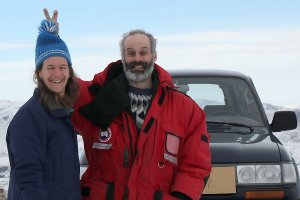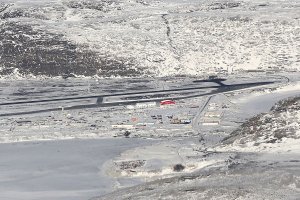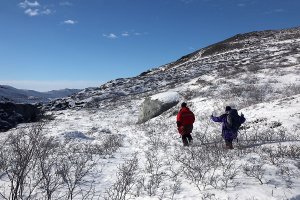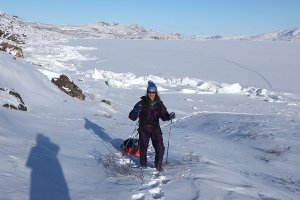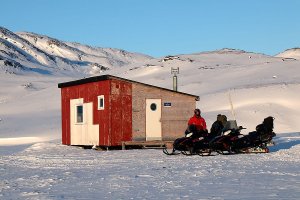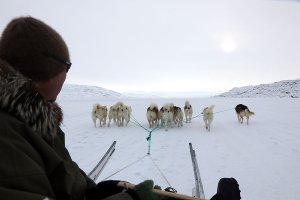Arto's Blog
White wilderness in Greenland
Posted: 2017-11-11 01:35:00, Categories: Travel, Hiking, Greenland, 1925 words (permalink)It's great to visit friends who live in exotic places. The
eccentric scientist and wilderness expert Phil invited us in Greenland, where
he works at a radar station just outside the town of Kangerlussuaq.
The town hosts the island's largest airport in addition to 600 inhabitants,
and is served by regular flights from Copenhagen, Denmark.
That was an offer we couldn't resist so in March 2017 we flew over to
experiment with various means of moving around in snow.
Upon landing, Phil was waiting for us in his Land Cruiser and we
drove 15 km to Kellyville, along the only road which goes that far
out of town. Kellyville consists of a big radar, main office and
storage building, five container houses for the employees and a
number of antennas and other measurement devices scattered around on
the neighbouring hills.
Our headquarters was Phil's house, furnished in 1980's American
style and stocked with all the outdoor equipment we could possible
need. Phil had to work on most of the days, but he
provided us a map and even a satellite phone, just in case we'd get
lost or have an emergency. During the following two weeks, we
explored the nearby surroundings on foot (with and without
snowshoes), on skis, by car, by a snowmobile and on a dog
sledge.
It was an arctic landscape of cliffs and small roundish mountains,
with numerous streams, moors and lakes in between. They were
naturally all frozen, as was the long fjord reaching over 100 km
from the Labrador sea to Kangerlussuaq. There was not very much
snow, the region gets little precipitation and the wind blows most
of it away from the bare surfaces. Here and there bushes and grass
were sticking out from the snow, hinting that in the summer
there would be a colourful carpet of arctic flowers.
On our fist day trip we walked along the road a couple of
kilometers further until it ended at an old warehouse filled with big rusting
engines. It had been used in the past by the U.S. military to power
a radio station, capable of sending a warning to the U.S. mainland
in case of an attack from the east. After a quick look inside the building
we headed towards the
nearest peak, simply choosing a passable route between the rocks
— there were no trails or paths.
On the way up, two reindeer passed by, searching for food under the
snow. We also saw many ptarmigan tracks but no birds. Within an
hour we reached the peak with views all the way until the huge ice
cap, which covers almost the whole Greenland except for the coastal
and most southern areas. It was a beautiful sunny day so we stopped
for a while to enjoy the scenery and a cup of hot tea from our
thermos.
We descended on the north side towards a lake and an abandoned
caravan next to it. We wondered a bit how it had ended up there, as
there were no roads leading up to the spot. The door was open so we
took a look inside. It looked almost like a stage set from the movie
Into the Wild, where Christopher McCandless leaves the civilization
behind to live in an abandoned bus in the middle of wilderness. The
idyll was broken only by the adjacent snowmobile and dog sledge
track connecting the towns of Sisimiut and Kangerlussuaq. We
followed the track around the mountain back to Phil's house to cook
dinner and spend a relaxing evening with him.
The day temperatures varied between -10 and -20°C, nights being about ten degrees colder. We had sunny and cloudy days but no really
bad weather during our two week stay. One of the sunniest but still the coldest days
was the one when we went skiing on the fjord. In addition to skis Phil borrowed us
a pulka to pull our extra clothes, drinks and snacks instead of carrying them on our
backs. The pulka could also be used as a sledge to slide down after climbing up a
small hill to enjoy the views.
On our day tours we saw
reindeer, a few birds and two times an arctic fox. Muscox would be
one more common sighting, but we didn't see any, only local hunters
heading out on their dog sledges to shoot some. It was the hunting
season and traditional ways of life are protected by allowing dog
sledges out in the wilderness, while restricting snow mobiles and
quads on a few marked routes.
Almost every day either Phil or one of his colleagues drove to
Kangerlussuaq, so we could easily get to the town if we wanted.
Most of the buildings were constructed by the U.S. Army during the time
the whole town was an air base. They have later been
converted to apartments and public spaces such as a school, swimming
hall and a restaurant/bar. The supermarket was surprisingly well
stocked and larger than one would expect for a population of 600.
The inhabitants are a mix of Greenlanders and people coming from all
corners of the world. Phil's Thai friends came once over to his
house and cooked all of us a sumptuous meal, with leftovers lasting
for several days. Authentic Thai food in Greenland - one of the
surprises of the trip.
One evening, Phil gave us a tour at the radar station. It was a
funky mix of analog and digital technology encompassing half a
century from the 1950's until this day. The radar is used for
measurements in the upper ionosphere, where polar lights are
formed. At his house, Phil only needs to have a quick glance at the
graphs on his TV screen to tell whether it's worth to go outside. A
couple of times during our stay we could enjoy the beautiful dancing
lights of the nature at night.
One of the highlights was our weekend trip together to Sisimiut,
the second largest town in Greenland with 5600 inhabitants. Phil was
able to organize us two snowmobiles — Sandra and I shared one
and he rode the other with a bit more luggage in the back. Tucked in
our warmest clothes, we set out for a 150 km ride on frozen lakes,
rivers, snow covered hills and a couple of small mountain passes.
The scenery was fantastic on both sides of the snowmobile track.
The small roundish hills near Kangerlussuaq turned into mountains, the
highest peak being Pingu 1306 meters above sea level. Mostly we
drove on lakes and rivers and once through a small canyon with high
walls on both sides. Streches crossing land were rather bumpy and we
had to carefully zig-zag between the rocks sticking out from the
snow. On the higher passes we had great views over the smaller
hilltops. There were a few basic shelters on the way to have a small
break or to stay overnight. We saw a few other snowmobile riders,
dog sledges and a few people on a ski tour, but most of the time it was
just the three of us.
Our travel speed varied mostly between 30-60km/h. On the smoothest
sections we drove sometimes a bit faster, but didn't push it near
the top speed. There is no snowmobile speed limit in Greenland and
the machines can do about 150 km/h — they're a bit like motorcycles,
but off-road and on snow. Even on lakes the snow often
accumulates in small ridges, which become dangerous jumps in high
speeds. With photo stops and a couple of small breaks it was a full
day ride. Sun was already setting when we arrived on top of the last
pass and saw the lights of Sisimiut ahead us.
One of the first houses belonged to Phil's friends, so we met
them and after a short chat headed together out to town center. We were
lucky: it was Friday evening and a couple of local bands were
playing at the multipurpose hall in the center. After a nice evening
we crashed for the night on the floor at the same friends' new house
— they were just about to move in there the next day!
Saturday morning we headed out for a walk around the town. It was a
mix of nice wooden family houses and bigger apartment blocks, all
painted in yellow, red, blue and other bright colours. Despite the
cold weather the sea was not frozen at the coast, and the local
marked offered various specialities such as seal meat and a fresh
sea elephant head. We had lunch with another friend of Phil's who
worked as a teacher at a local school. Most of the teachers come
from Denmark and Danish is the main language, but also the local
Inuit language is partly used in the schools. At the end of the day,
we fetched our snowmobiles and checked into a hotel for the night.
On Sunday we woke up to a sunny morning with about 30 centimeters
of fresh snow. That made our ride back to Kangerlussuaq smoother and
even more beautiful than the other direction had been. We were the
first ones on the track, which was now barely visible — it was
good that Phil was able to guide us on the right way. We just had to
give enough gas in the steep uphills to avoid getting stuck in the
soft snow in the middle of the slope.
On the way we had a coffee break
at a cozy wooden hut built by a local carpenter from Sisimiut. The Greenlandic
flag was up indicating "Kaffemik" which means that
everybody passing by is welcome to stop by for a visit. Often that
means a house full of visitors, but at Amalie's wilderness hut we
were the only guests. It was already dark when we came back to
Phil's house, tired but happy.
On the last day before our departure we booked a two-hour sledge dog
tour on the fjord ice. That was a quite pleasant way to travel,
sitting relaxed on the sledge while the dogs were slowly jogging in
front. Compared to the sledge dogs in Finnish or Swedish Lapland,
the Greenlandic dogs are slower but have more endurance to run for
hours and hours, covering longer distances per day. Contact was
again through Phil, who recommended Jan as he treats his animals
better than many other dog owners. After the ride, Sandra got to hold
one of the puppies, which was at the same time very cute and stinky.
On the day of our return it was snowing and windy and Phil's four
wheel drive car was the right vehicle to get from Kellyville to the
Kangerlussuaq airport. Our return flight was delayed by more than
ten hours. It waited for other planes coming from other towns and
finally left late in the evening instead of in the morning. That's
not a rare event in Greenland, a good reminder that despite all the
modern services it's still an arctic and remote location. Greenland
air is also specifically exempt on paying any reimbursement for
delays in such cases. We did get a dinner at the airport on their
tab, and only missed one night of sleep in Copenhagen — the
flight arrived early in the morning and we were still able to catch
our connecting flight to Munich.
Greenland was certainly one of the most interesting places we've been to, and we hope to return there some day. Perhaps next time during the short arctic summer, when the coastal areas are free from snow and full of flowers in various colours.

Copyright Arto Teräs <ajt@iki.fi>, licensed under the Creative Commons Attribution-Share Alike 3.0 Unported License. (Unless otherwise mentioned in individual photos or other content.)
